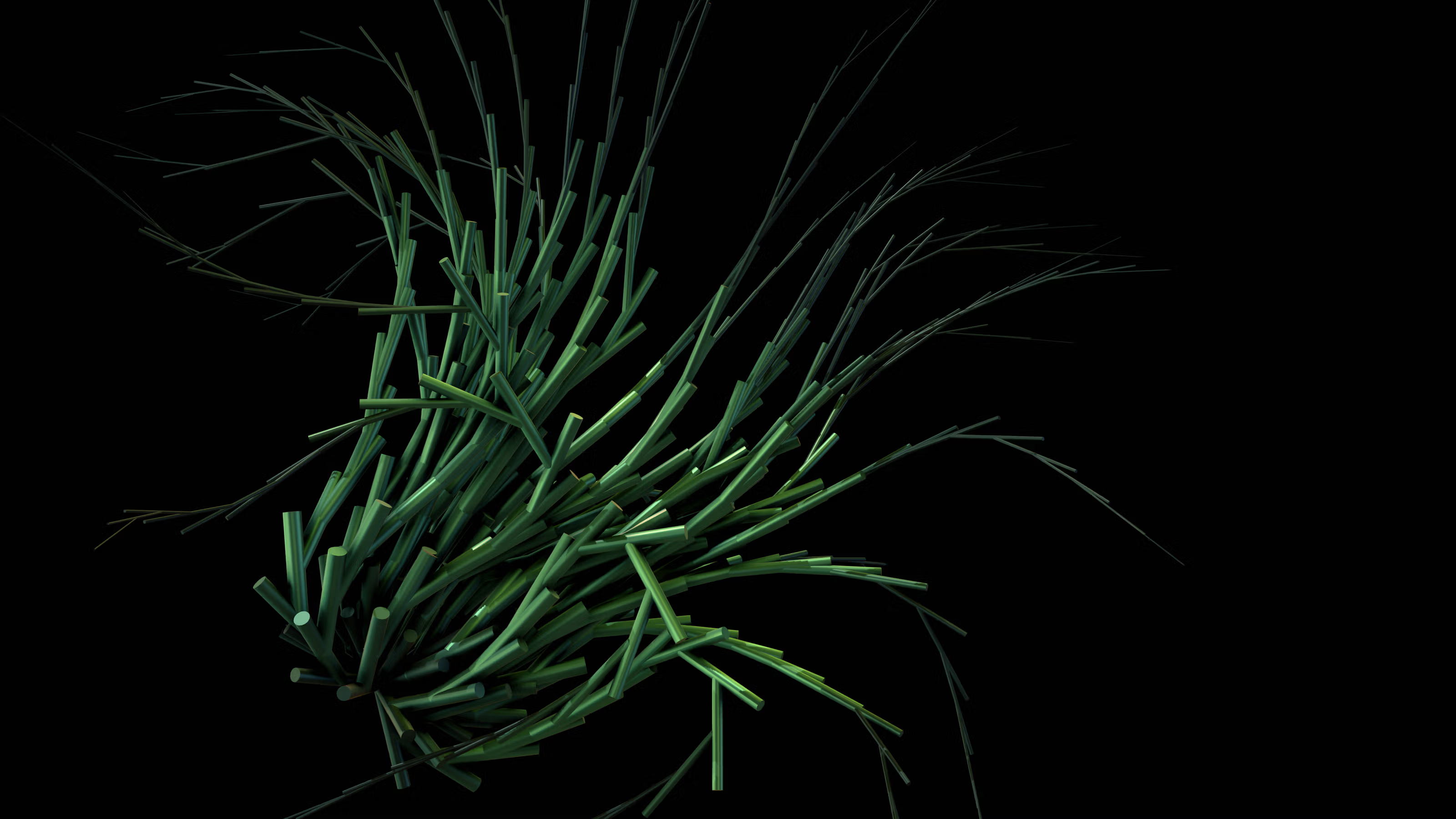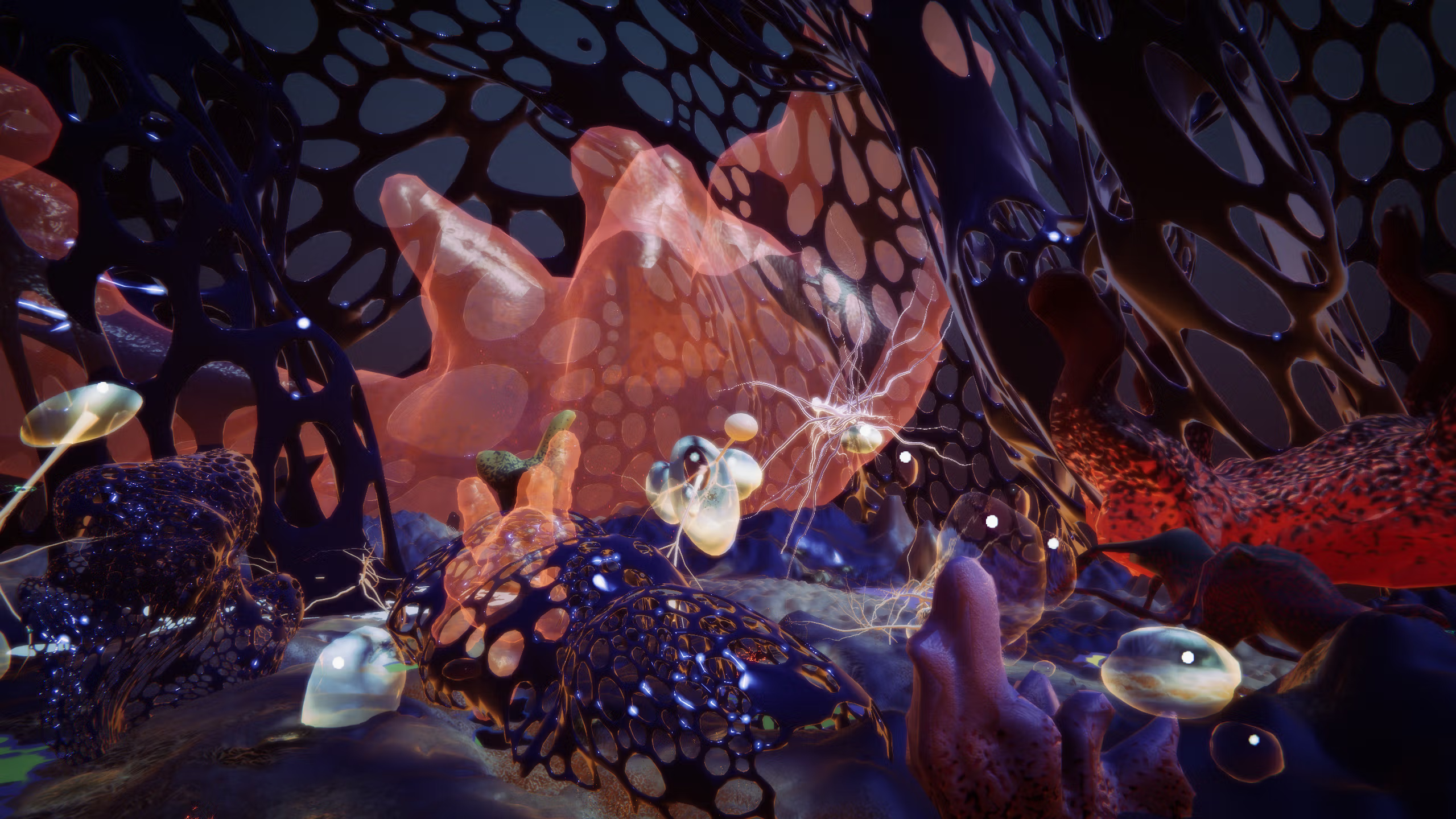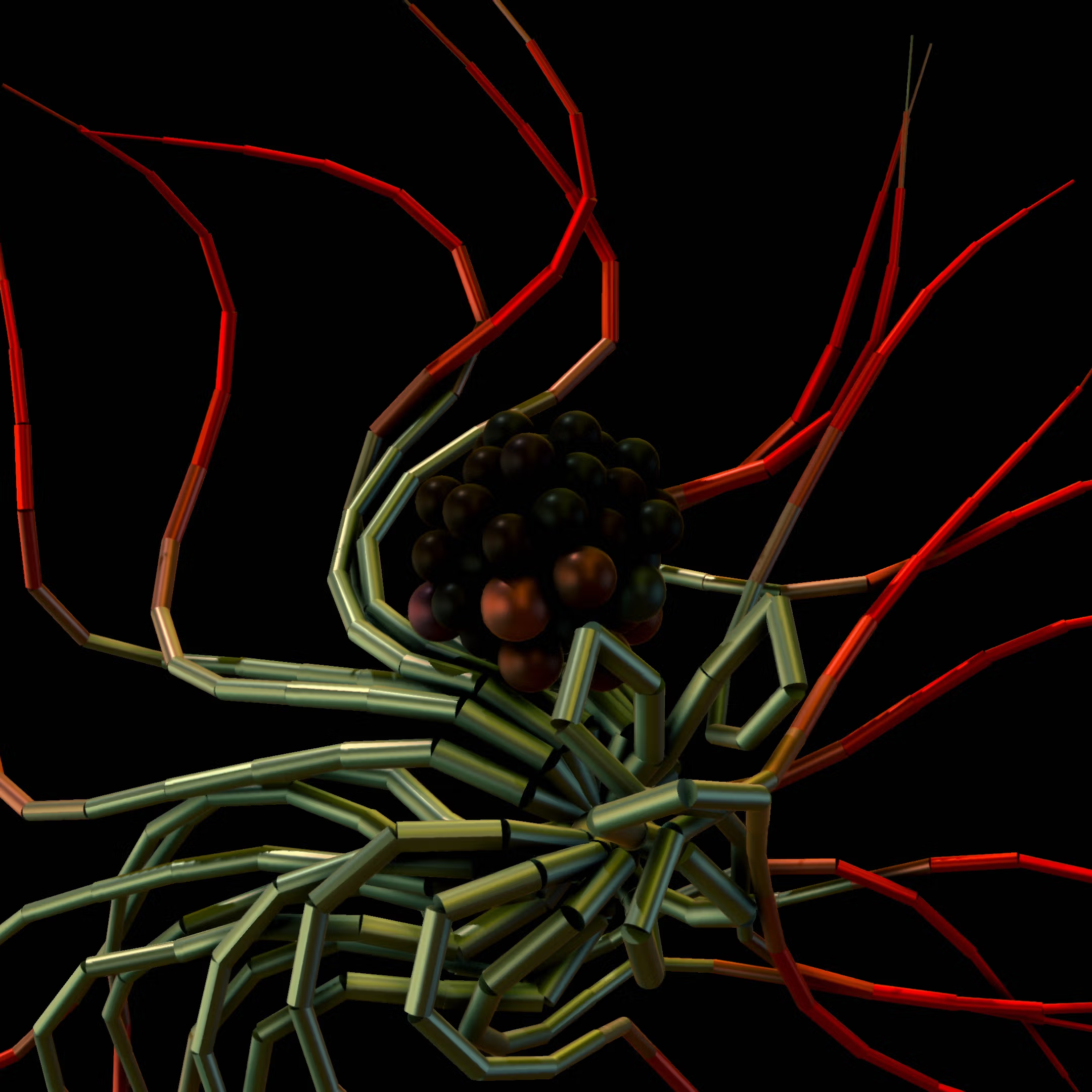The exhibition combines Marpi Studio's The Nordic Ocean Series with Sissel Marie Tonn's The Sentinel Self, taking the audience on a journey deep into the ocean's inner life and the challenges it faces.
In The Nordic Ocean Series, the audience is invited into a digital universe filled with futuristic and organic ocean creatures, where vibrant colors and dynamic projections visualize the fragile yet magnificent world underwater. The work unfolds in the S-Lab, a space that transforms into a kind of reverse aquarium where the audience can interact with fascinating beings.
Sissel Marie Tonn’s The Sentinel Self explores the connections between the human body and ocean ecosystems, where microplastics invade both the external environment and our own immune systems. Through interactive simulations of cell-like organisms, the audience experiences an ever-changing world where pollution threatens the balance.
Together, these works offer a powerful reflection on the interaction between humanity, technology, and nature, presenting the ocean's depths as both a home of beauty and a reminder of our impact on the environment.
About The Nordic Ocean Series

The Nordic Ocean Series is an inversion into a mysterious world filled with tentacles and algae from the deep waters. Futuristic ocean creatures, yet organic and familiar in shape and form, drift over digital currents.
Based on the original artwork Sound of the Sea (2019), an organic, procedurally generated piece visually inspired by the ornate, spiny beauty of lionfish, the merged flora-and-fauna qualities of sea dragons, and the hypnotic patterns of cuttlefish. This enhanced version resurfaces vibrant colors and dynamic visual rhythm from the undersea.
Extravagant forms unfurl within the S-Lab, a cube-shaped space that can transform entirely through dynamic projections, immersing — or submerging — audiences in a kind of reverse vessel, where they find themselves on display to curious underwater giants, like goldfish peering out from a bowl.
Tentacles and feelers reach out to and around digital avatars, mapped by Kinect sensors; as audiences touch the forms, the forms touch back. This mix of inputs — time, algorithms, people tracking — becomes a dance and a soundtrack, playfully co-created on both sides of the screen.
Credits:
Marpi Studio Code: Marpi Sound Design: Bent Stamnes Production: Alexandra Sentís
About Marpi Studio
Marpi Studio creates interactive alien life-forms through art and experimentation.
Their creations are inspired by the complexities found in the natural world, and the possibilities of alternate futures.
The artworks create inhabited worlds through bespoke code and encourage communication between organic visitors and the digital species, systems, and processes that live there. Marpi invite the audiences to co-create, transforming their gestures and actions into physics that shape the work in playful and unexpected ways.
Marpi Studio collaborates with scientists and architects, roboticists and engineers, electronic musicians and graffiti artists.
If you'd like to see more from Marpi Studio, check out Marpi OS on Steam and @marpistudio on social media.
About The Sentinel Self

The Sentinel Self is an interactive artwork that reflects on the entanglements between human immune systems and environments increasingly polluted by microplastics.
Built within a video game engine, The Sentinel Self is an ongoing and complex simulation of hundreds of interacting cell-like creatures within a vast aquatic, body-like ecosystem.
Sentinels is the collective name given by environmental scientists to organisms whose sensitivity to environmental change helps to understand the health and vulnerability of an ecosystem. The study of sentinel organisms in the oceans sheds light on the effects of microplastic pollution and recent research has shown that microplastic pollution is also found within human bodies, suggesting that humans have joined the ranks of the sentinel species. Inspired by conversations with immunologists, eco-toxicologists, and biological physicists, Sissel Marie Tonn has created a simulation that explores concerns about microplastics and their impact on both ecologies and our own immune systems.
When entering the installation The Sentinel Self, the audience encounters an aquatic world inhabited by humanoid “sentinels”. When connected to a heart-beat sensing sculpture, they can travel deeper inside these bodies and explore their vast internal ecosystem. This ecosystem is populated by cell-like creatures, who roam around this body/ecosystem attempting to maintain homeostasis, much like immune cells or the keystone species of ecosystems. As microplastic particles flow across the porous boundaries separating body and the outer world, audience can observe the interference of microplastics and their complex interaction with the sentinels’ immune system, bringing a gradual risk of an eco/immuno-systemic collapse. As the simulation evolves over time, the audience becomes witness to the blurring boundaries between the internal and external ecosystems, alluding to the reality that humans do not only transform the world, but that the world also transforms us in return.
Finally, The Sentinel Self Wiki is an online resource created in collaboration with eco-toxicologist and microplastics expert Heather Leslie that outlines both the various creatures inhabiting the world within The Sentinel Self, as well as the real-world implications and histories of plastic. This online resource is available for audience visiting the installation, as well as those interested in the work but unable to see it live. It is designed by DXR Zone.
Credits
Created by Sissel Marie Tonn Unity Development - George Simms, Titouan Millet, Neander Giljam 3D world building and design - Zuza Banasińska Music and Sound - Jonathan Chaim Reus Interaction and hardware design - Sam Bilbow Project support - CheeYee Tang Webdesign - Rifke Sadleir Scientific advisors - Juan J. Garcia Vallejo (VU Amsterdam), Heather A. Leslie, Alessio Ansuini, Francesca Cuturello, Alberto Cazzaniga, Lisa Vaccari (Area Science Park).
Created with the support of: S+T+ARTS, Stroom Den Haag, Creative Industries Fund NL, The Sussex Humanities Lab, MEET Digital Culture Center
About Sissel Marie Tonn
Sissel Marie Tonn is a Danish artist living and working in The Hague. Sissel has a bachelor in Film and Media studies from University of Copenhagen. She completed a master in Artistic Research at the Royal Academy of Art in The Hague in 2015. She was the recipient of the Theodora Niemeijer prize for emerging female artists in 2016, resulting in her first solo show at the Eye in Van Abbemuseum, Eindhoven. In 2017 - 2018 she was a resident at the Jan van Eyck Academie in Maastricht. She received the talent development grant from Stimuleringsfonds NL in 2019, and in 2020 she was the recipient of the BAD Award, together with scientists Heather Leslie and Juan J. Garcia Vallejo for their project “Becoming A Sentinel Species”. Her work is frequently exhibited in The Netherlands and internationally.
About Lumen Studios
Lumen Studios is an international organization based in London and the USA, dedicated to promoting digital art. Kunstsilo has collaborated with Lumen since 2020, which, in addition to digital exhibitions, includes a partnership on the Lumen Nordic Award—a prize for artists in the Nordic region working in the fields of art and technology. The award is presented annually in London.
Both Marpi Studio and Sissel Marie Tonn are Lumen listed artists and part of the global Lumen network.

